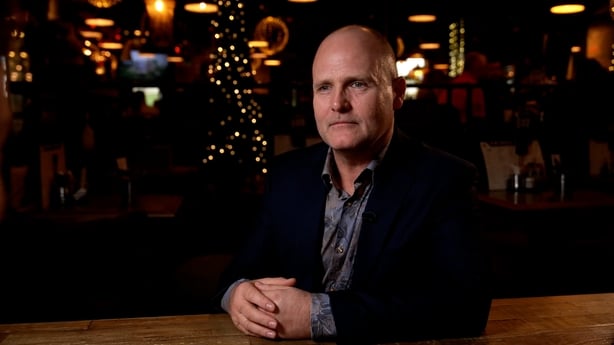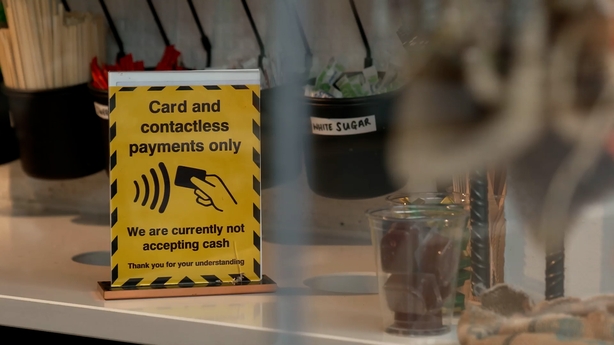As the National Driver Licence Service (NDLS) insists that it will continue to refuse cash payments, Prime Time's Louise Byrne has been asking if the future of cash hangs in the balance.
A video of UFC fighter Conor McGregor's Dad went viral after Tony McGregor complained bitterly that he was given a fistful of "coinage" as change when buying a Dart ticket.
"I wear a slim-fit, Hugo Boss suit," Mr McGregor lamented. "I have no room to put those coins anywhere."
The reaction to a handful of coins was lampooned online but it may have been emblematic of a move towards an increasingly cashless society.
The value of mobile phone payments at tills around the country has doubled in just 12 months, according to Central Bank figures.
In October last year, €510 million was spent using phones at points of sale, while the figure rocketed to €1bn in the same month this year. The addition of banking and payments app Revolut to the data in March will have inflated the numbers but the trajectory is clear.
The Aviva Stadium and 3 Arena are both cashless venues. GAA county grounds do not have cash turnstiles and a small but growing number of cafes and restaurants only accept cards.
Paul Dolan, owner of the Barn restaurant in Glanmire, Co Cork, told Prime Time that after a number of years of card only trading he’ll never go back to accepting cash.
Handling, lodging and withdrawing cash adds around 9% to overheads of a large restaurant, he said.
"At the end of the night our managers just close up and walk out. They don't have to spend an hour or two cashing up all the tills."
Not requiring cash transfers or bank lodgements saves a significant amount of money, along with the time waiting staff save not bringing change to and from tables, Mr Dolan told the programme.
"There's also cash drawer shrinkage which is accepted to be about 2.5%. If you get a calculator out, it really does add up."

The reduction in costs has allowed the restaurant to lower prices, he said.
"I charge €15.50 for a carvery but if I took cash I’d have to charge closer to €17."
Currently, businesses can legally refuse to accept cash once customers are made aware of the policy.
Mr Dolan said staff can still receive tips by card and while customers without cards are accommodated, it rarely happens.
"The vast majority of our older clientele all have cards. They're a lot more tech savvy than we give them credit for."
Cash infrastructure
Despite the popularity of cards, cash is still the dominant form of payment at tills around the country.
According to a European Central Bank survey of 2,000 people in Ireland, 54% of transactions last year were paid for with cash, 37% with card, 6% using a mobile phone, and the remaining 3% with other methods.
But Ireland’s cash use is declining; it’s down 14% on 2019 figures and below the Eurozone average.
Author and former financial broker Brett Scott describes the issue as the great battle of our time.
Banking, finance and tech companies all have a vested interest in getting rid of the cash system, Mr Scott told Prime Time.
"These big players have pushed out propaganda and undermined the cash infrastructure, making it harder to use."
Institutions, according to Mr Scott, have reduced access to cash and ATMs creating a "feedback loop" which encourages the use of digital payments.
"It's much harder to get cash so people will find it more convenient to use the apps," he said.
It's estimated that around 5% of Irish adults don’t have a bank account and campaigners insist that there are older people who also need to be accommodated with cash.
Last year, a public outcry forced AIB to row back on a decision to remove cash-handling facilities, including ATMs, from 70 branches.
Identity and history
Coins and notes are also a part of who we are, argues coin enthusiast Greg Carley, who is Chair of the Numismatic Society of Ireland.
"When we got our independence, we needed our own coinage so a fabulous range of coins was designed which reflected Ireland as we wanted it to be reflected," he told Prime Time during an interview at the National Museum of Ireland, Decorative Arts and History, at Collins Barracks.
The Airgead exhibition at the museum traces the history of Irish coins and notes and showcases, among centuries of currency, the coins of the new Free State which pointedly did not include the King’s head.
"We did not want to be beholden to the English monarchy and this was a strong statement of our independence," Mr Carley reflected.
It might be expected that a coin collector would make the case for the continuing survival of cash, but he insists going completely cashless would involve more than just a loss of history or culture.
"Over-dependence on one way of buying and selling anything is dangerous. We are leaving ourselves very vulnerable to being hacked."
There’s a risk banks could decide not to give someone a bank account and render them "as nearly stateless as possible," he added.
"They know what you've had for your breakfast, for your dinner, for your tea. They know how much wine you drink every week and whether you've increased the amount you're drinking. They have a huge amount of information."
Payment data
Data from cards and payments is extremely valuable, according to Brett Scott.
"What you spend really reveals what your priorities in life are," he said, arguing that companies want to be able to demonstrate a link between advertising and consumer spending.
"If they can correlate a person's browsing behaviour with credit card data they can start to show that their advertising is effective."

Some of those exercised by a move away from cash were also outspoken during the pandemic.
The two issues intersected when banks in Canada were given the power to freeze accounts of those suspected to be involved in anti-vaccine blockades in 2022.
Posters in Dublin city warn of the "dangers of a cashless society" and a "war on cash".
Campaigners caution that if governments can see into people’s wallets they could, in theory, try to control what they spend their money on.
Restaurateur Paul Dolan said his business has been subjected to online criticism for its position on cash.
"People do attack us on social media if they hear that we’re cashless but it lasts for two or three days and then it's gone again," he told Prime Time.
"We're not the only show in town. If you feel so strongly that you want to use your cash, then there are numerous other places around."
Mr Dolan and other business owners who have gone cash-free highlight the security benefits of not holding large amounts of cash and it’s often suggested that moving to card payments will help reduce crime and tax avoidance.
Brett Scott disagrees. "Transnational crime will find new ways to do things but you end up with much bigger problems in your society because you've lost the balance of power in your monetary system."
For financial advisor John Lowe, the convenience of cash outweighs any privacy concerns.
"It doesn't matter to me if my card statement is available publicly. I have nothing to hide," said the founder of Moneydoctors.ie.
"The only place where it doesn't work is if you're going to apply for a mortgage and you've got 20 betting companies on your statement."
While using envelopes with cash is sometimes suggested as a helpful way to budget, Mr Lowe says cash isn’t required.
"You budget with a planning spreadsheet and you work out precisely what you are spending. You don't need to do it in cash terms."
Government mandates
However, the march to a cashless society may be starting to slow down. Government changes on the cards mean critical businesses could be mandated to accept notes and coins while a similar move is being considered by the European Union.
The European Central Bank wants laws to go even further and clearly indicate that exclusions of cash are prohibited even if retailers put "no cash" signs at shop entrances or check-outs.
Minister for Finance Michael McGrath said "cash is here to stay" when he launched a public consultation looking for people's views on a National Payments Strategy last week.
Following a confirmation from the National Driver Licence Service (NDLS) to Prime Time that cash is still not accepted at 34 driving licence centres around the country, the minister called on the service to reverse its policy of refusing to accept cash payments.
READ MORE: RSA should reverse no cash policy for driving licences - McGrath
In a statement to Prime Time, the minister said he had made it clear on a number of occasions that cash will continue to be an integral part of the payment system in Ireland and he believes the NDLS should make cash payment facilities available to those who require them.
"I expect all essential public services provided by the State and on behalf of the State to be accessible to members of the public whose preference is to transact in cash."
In a statement, the Road Safety Authority (RSA), which operates the NDLS, said the cashless policy was introduced during the Covid-19 pandemic and predated the minister’s guidance.
"This policy is consistent with the most up-to-date Government guidance which advises organisations that currently accept cash to continue to do so, until a new National Payment Strategy is brought forward.
"The RSA will not change the cashless model in place, until further Government guidance is provided to do so," the statement added.
An online service is available for all licences once applicants have a public services card. Those wishing to pay for a driving licence in person must use cards, mobile phones or Payzone vouchers. Cash handling, the RSA said, introduces additional complexity, including security, safe storage, transfer to the bank and reconciliation.
While Tony McGregor may succeed in keeping his suits free of "coinage", the future of cash is still in the balance.
Watch reporter Louise Byrne and producer Isabel Perceval's report on Prime Time at 9.35pm on RTÉ One and RTÉ Player.







